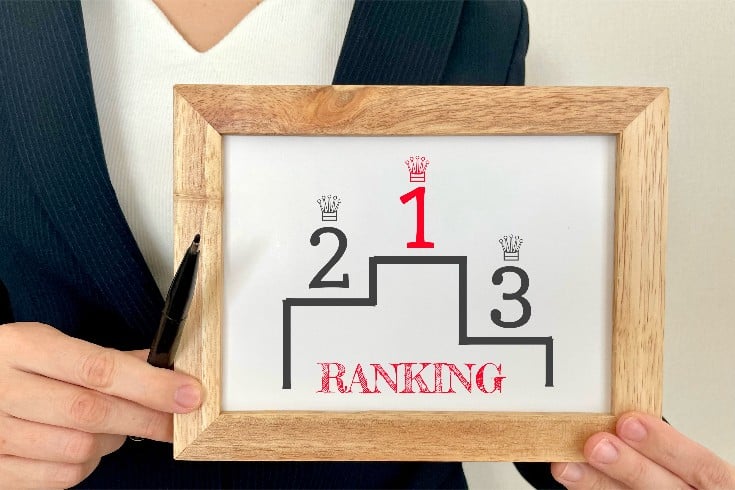Removal of Self-Made and Affiliate Ranking Sites

In the world today, many people search for products and services through the internet, compare them based on the information obtained, and make purchasing decisions. Especially when using online shopping, since it is not possible to check the actual product, online reviews and reputations have a very strong influence, and for companies, it can sometimes become a matter of life and death.
What is a Ranking Site?
On the internet, you can come across various rankings. Rankings such as “Cutest Number One Actress” or “The Strongest Morning Drama of the Heisei Era (1989-2019)” can be fun to browse through, making you think, “Really?” or “I almost forgot about that one.” Rankings like “Kanji Characters Often Misread” can also serve as a mini quiz, making for a good pastime.
There are ranking sites that compile these kinds of rankings, such as “Goo Ranking”, and there are also those created by women’s magazines or product comparison magazines. In the latter, various products are compared based on different themes.
There isn’t much of a problem with these ranking sites. They are just for fun and cause little harm. Readers enjoy them without questioning things like “How many people were surveyed?” “What kind of people were surveyed?” or “What were the exact questions asked?” There’s no need to seriously scrutinize them. Accuracy and truthfulness are not required here.
However, there are ranking sites that are not created by “Goo Ranking”, women’s magazines, or product comparison magazines.
Such sites are created by someone with a certain purpose in mind. There are many “self-made ranking sites” and “ranking sites created by affiliates”.
What is a Self-Made Ranking Site?
Almost every company selling products or services has rival companies. Therefore, creating a ranking site featuring their own products or services can be a straightforward way to advertise. By comparing their products or services with those of their competitors, they can show that their offerings are superior and dominate the top rankings.
Moreover, not only can they promote their own products or services, but they can also run a negative campaign that disparages the products or services of other companies, thereby lowering their ratings.
Many people are accustomed to rankings and rarely question things like “how many people were surveyed,” “what kind of people were surveyed,” or “what were the questions like.”
Even if they are told that the rankings are based on “customer reviews,” and they think to take it with a grain of salt, they generally accept it because they lack specialized knowledge.
Creating a self-made ranking site can be a tempting proposition, but there have been cases where companies have actually done this and been caught.
Lawsuit Against Self-Made Ranking Site
A certain home renovation company created its own review site and ranked itself in the first place. In a lawsuit where a rival company sought damages for this, the Osaka District Court partially accepted the claim for damages, stating that the renovation company had inflated its own ratings with fictitious posts.
In the judgment, it was stated that the renovation company had made fictitious posts on the site it had created, both before and after its establishment, and indicated as follows:
The defendant, by making a considerable number of fictitious posts, is reasonably presumed to have created the display of being ranked first.
Osaka District Court, April 11, 2019 (2019) Judgment
From the above, it is recognized that there is a discrepancy between the actual number and content of reviews and the display of the defendant being ranked first on this site.
As stated above, the Osaka District Court partially accepted the claim for damages, stating that the self-made ranking was fraudulent, and also found that there was an act of inducing misrecognition of quality under the Japanese Unfair Competition Prevention Act.
Ranking Sites Created by Affiliates

Many ranking and comparison sites are affiliate sites created by affiliates.
Affiliate marketing is a business model where individuals, known as affiliates, partner with companies (content holders) that own products or services through advertising agencies called Affiliate Service Providers (ASPs) such as A8.net, Amazon, and afb. Affiliates use their blogs or social media to review these products or services, and earn a commission (affiliate reward) by leading to sales.
Affiliate marketing is particularly popular in the online business world because it allows individuals to start their own businesses with minimal financial risk and the potential for significant profits if done well. Moreover, it is considered highly convenient for advertisers as the relationship between advertising effectiveness and cost is direct.
In this context, affiliates who create ranking sites earn income by getting people to use the products or services of the companies they partner with. Therefore, they arrange for the products or services they want people to click on to appear at the top of the rankings, inevitably pushing down the products or services of companies they are not affiliated with. In some cases, they may even resort to defamation. While it’s one thing to praise the products or services of a specific company, it’s quite another to lower the ratings of a rival company’s products or services in order to sell more and boost the reputation of the products that earn them commissions. Such behavior is despicable and unacceptable.
Lawsuit Against Affiliates
A company engaged in the planning, development, and sales of foreign language teaching materials requested Google to disclose the sender’s information in order to claim damages and future injunctions based on the tort of defamation against an affiliate. This request was granted in court.
On a website operated by an affiliate, it was ostensibly dedicated to thoroughly comparing English conversation materials. However, in reality, it praised the English conversation materials of Company A, while stating that the materials of Company B were “completely ineffective for English conversation learning” and “inappropriate”. It also claimed that Company B’s advertising methods were “fraudulent and deceptive, using misleading slogans”, and that there were “many complaints from consumers” about Company B’s materials.
This website had links to sites selling Company A’s materials. It was an affiliate site where a percentage of the purchase price was paid to the affiliate if someone purchased Company A’s materials after viewing this website. When searching for Company B or its representative’s name on Google, words like “fraud” and “deceived” were displayed. Therefore, Company B requested Google to disclose the sender’s information in order to claim damages and future injunctions against this affiliate. The Tokyo District Court made the following statement:
Considering the entire description of this site and the context before and after this post, it is reasonable to recognize that this post does not merely compare the English conversation materials recommended by this site with the plaintiff’s materials, but consistently points out the fact that the plaintiff’s materials are completely ineffective for English conversation learning and are inappropriate products, while spending most of the description. It also points out the fact that the plaintiff’s advertising methods are fraudulent and deceptive, using misleading slogans, and further, that there are many complaints from consumers about the plaintiff’s materials due to these reasons.
Tokyo District Court, July 13, 2015 (2015)
It was recognized that these series of posts give a bad impression of Company B’s materials to general readers and clearly lower the social evaluation of Company B.
Although the operator information of this site states that this site is aimed at thoroughly investigating the effectiveness of English conversation materials by actually experiencing them by a group of volunteers called C, it is recognized that this site is actually an affiliate site for English teaching materials ranked 1st to 3rd recommended by this site. According to this fact, this site should be considered as mainly aiming to earn affiliate rewards by inducing the purchase of specific English teaching materials by giving a bad impression and lowering the evaluation not only of the content of the plaintiff’s materials but also of its advertising methods. Therefore, it cannot be recognized that this post is solely for the purpose of public benefit.
Ibid
As a result, Google was ordered to disclose the sender’s information.
How Should Affiliate Ranking Sites Operate?
If a statement is merely a personal opinion, such as “I used Company B’s materials, but I didn’t feel they were effective for me,” it does not constitute defamation that would lower the social reputation of Company B.
If there are sufficient reasons to believe that Company B’s advertising methods are fraudulent or deceptive, intentionally leading general consumers to misunderstand, and if there is a possibility of actual fraudulent activities, it is necessary to widely share this information with the general public and sound an alarm to consumers to prevent further damage. This is recognized as serving the public interest.
The mistake of the above-mentioned affiliate is that they have gone beyond the acceptable range of criticism, such as comments on the content of the materials, for the sake of profit, and have made groundless slander. Moreover, they have described Company B’s advertising methods as fraudulent or deceptive, as if Company B had committed fraud or similar acts. This is clearly overdoing it.
There is no problem with affiliate marketing itself. Not all affiliates are malicious. Many affiliates operate with the desire to use their own experiences and introduce quality products to consumers. If conducted in a healthy manner, affiliate marketing is an excellent business model that meets the demands of the times.
Of course, from the perspective of those providing products or services, the disadvantages brought about by ranking sites or comparison sites, whether they are self-made by competing companies or by affiliates, are serious, and there is no need to accept them. Please consult with our experienced lawyers at our firm. We will respond promptly.
Category: Internet





















